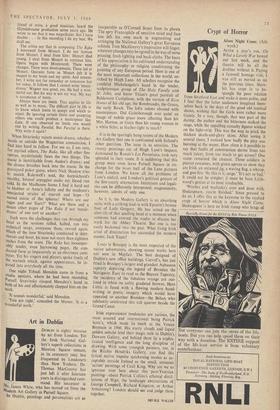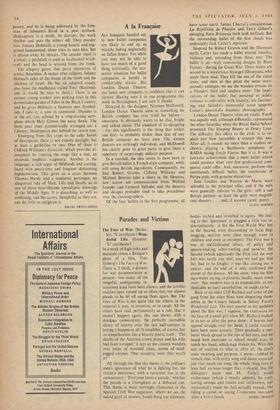Crypt of Horror
AFTER a year's run, Oh What a Lovely War bowed out last week, and the theatre will be all the drabber without it. Paying a farewell homage visit, I was still as moved as on the previous times. Show- biz has crept in to be- spangle the poor relation from Stratford East and make it more polite, and I fear that the latter audiences imagined them- selves back in the days of the good old musical shows, wishing that the Girls were rather more Gaiety. In a way, though, that was part of the daring; the pathos and the bitterness stalked the stage, while the appalling casualty figures winked on the light-strip. This was the way to prick the thickest death-and-glory skins. After seeing it several times, I noticed how badly the play was bursting at the seams. How often is it possible to say that faults of construction derive from too much talent, from too much to get across? One scene , remained the clearest. Three soldiers in pierrot costumes, with green aprons to show they are Irish, an untamed jig, a waving flag, a whoop, and gun-fire. `So this is it, sarge."It's not so bad.' It could not be simpler; it must be Joan Little- wood's genius at its most irreducible.
'Witches and warlocks's over and done with, Shakespeare, you'm finished.' Since pressed to do so, I offer this as the keystone to the vaulted crypt of horror which is Afore Night Come. Shakespeare is here an Irish tramp who brags of poetry, and he is being addressed by the fore- men of labourers hired in a pear orchard. Shakespeare is a misfit, he disrupts the work rhythm and puts the others off. They murder him. Johnny Hobnails, a young lunatic and sug- gested homosexual, alone tries to save him, but is driven away by threats. The murder itself is a ritual; a pitchfork is used as in classical witch- craft and the head is severed from the trunk.
The allegory game, that party relaxation of critics, flourishes. A seeker after religion, Johnny Hobnails talks of the blood of the lamb and the children of Israel. He has an, adopted cousin, also from the madhouse, called Tiny. (Rational- ism, it would be nice to think.) There is an earnest young student also picking fruit in this doom-laden garden of Eden in the Black Country, and he gives Hobnails a fountain pen. Symbol- ism, I take it, is now in command. Thunder is in the air, too, echoed by a crop-dusting aero- plane which Holy Ghosts the nasty finale. The three pear trees symmetrically arranged are a Calvary; Shakespeare dies behind the centre tree.
Emerging from this crypt to the safer haven of description, there is not exactly daylight, but at least a guide-line or two. One of these is Clifford Williams's direction, which provides at- mosphere by treating the stage like a tent, an enclosed, mephitic stagnancy. Another is the language, a Lich argot of Midlands and cursing. laced with poeticisms and frequent dislocating highbrowisms. This gives us a cross between Thomas Hardy and a medimval grotesque, an allegorical ride of Man, Life and Death, as in one of those near-obscene apocalyptic drawings of the Middle Ages. It is disturbing, as well as confusing, and the actors, thoughtful as they are, can do little to enlighten it.
DAVID PRYCE-JONES































 Previous page
Previous page